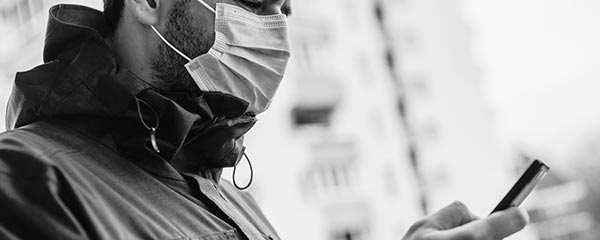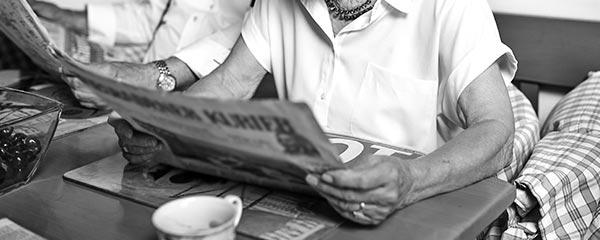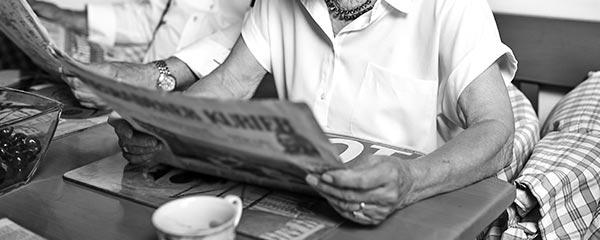Story Highlights
- 70% find public officials' posts about coronavirus situation helpful
- Over half say social media use remains the same as before coronavirus
- 74% see social media as important for staying connected during pandemic
WASHINGTON, D.C. -- Social media platforms have become saturated with coronavirus-related news, with 46% of social media users saying "almost all" or "most" of what they see is about the coronavirus situation and an additional 37% saying "about half" is.
These results are from an April 14-20 ║┌┴¤═°/Knight Foundation survey focused on the coronavirus situation, part of Knight Foundation's initiative.
Over two-thirds of social media users say coronavirus-related posts that they see from public officials (70%) and news organizations (68%) are "very" or "moderately" helpful. Fifty-seven percent say the same about posts from family members and friends, while fewer say so about posts from neighbors (43%).
| All users | Republicans | Independents | Democrats | ||||||||||||||||||||||||||||||||||||||||||||||||||||||||||||||||||||||||||||||||||||||||||||||||
|---|---|---|---|---|---|---|---|---|---|---|---|---|---|---|---|---|---|---|---|---|---|---|---|---|---|---|---|---|---|---|---|---|---|---|---|---|---|---|---|---|---|---|---|---|---|---|---|---|---|---|---|---|---|---|---|---|---|---|---|---|---|---|---|---|---|---|---|---|---|---|---|---|---|---|---|---|---|---|---|---|---|---|---|---|---|---|---|---|---|---|---|---|---|---|---|---|---|---|---|
| % | % | % | % | ||||||||||||||||||||||||||||||||||||||||||||||||||||||||||||||||||||||||||||||||||||||||||||||||
| Posts from public officials | 70 | 64 | 66 | 78 | |||||||||||||||||||||||||||||||||||||||||||||||||||||||||||||||||||||||||||||||||||||||||||||||
| Posts from news organizations | 68 | 50 | 65 | 84 | |||||||||||||||||||||||||||||||||||||||||||||||||||||||||||||||||||||||||||||||||||||||||||||||
| Posts from family members | 57 | 63 | 50 | 56 | |||||||||||||||||||||||||||||||||||||||||||||||||||||||||||||||||||||||||||||||||||||||||||||||
| Posts from friends | 57 | 59 | 53 | 57 | |||||||||||||||||||||||||||||||||||||||||||||||||||||||||||||||||||||||||||||||||||||||||||||||
| Posts from neighbors | 43 | 46 | 38 | 43 | |||||||||||||||||||||||||||||||||||||||||||||||||||||||||||||||||||||||||||||||||||||||||||||||
| ║┌┴¤═°/Knight Foundation, April 14-20, 2020 | |||||||||||||||||||||||||||||||||||||||||||||||||||||||||||||||||||||||||||||||||||||||||||||||||||
Roughly eight in 10 Democrats who use social media say they find posts by news organizations and public officials to be helpful -- significantly higher percentages than other party groups give to those same sources, or any other source, of social media posts. Republicans, who tend to have very low levels of , are less likely to find social media posts by news organizations helpful, but still half of Republican social media users do.
Communications from public officials through these platforms are regarded as helpful across all social media users, regardless of the match between their party affiliation and the party leanings of their local area -- however, somewhat less so among Republicans living in Democratic areas. Fifty-nine percent of Republicans who live in deep Democratic counties find posts from public officials helpful, compared with 64% in swing counties and 70% in deep Republican counties. Among Democrats, about 80% find such posts helpful, regardless of the partisan composition of the county in which they live.

Importance of Social Media During Isolation
Despite significant changes to many Americans' daily routines and media consumption brought about by the coronavirus situation, a majority (57%) do not report any change to their social media habits, while 25% say they are using it more often and 7% less often. The remaining 10% do not use social media. Women (31%) are more likely than men (18%) to report using social media more often during the pandemic.

While social media habits have largely remained steady, many users recognize the important role these platforms play in staying connected during social isolation. Seventy-four percent of Americans who use social media say it has been "very" or "moderately" important to them personally as a way to stay connected with people who are close to them that they may not be able to see in person during the coronavirus situation. And 63% say the same about the ability to stay connected with people in their city, town or local community. Fewer social media users say it has served as an important source of information about the coronavirus and how to avoid being infected (48%) or as an important way to share their experiences, feelings and opinions about the coronavirus with others (41%).
| All users | Men | Women | 18-34 | 35-54 | 55+ | ||||||||||||||||||||||||||||||||||||||||||||||||||||||||||||||||||||||||||||||||||||||||||||||
|---|---|---|---|---|---|---|---|---|---|---|---|---|---|---|---|---|---|---|---|---|---|---|---|---|---|---|---|---|---|---|---|---|---|---|---|---|---|---|---|---|---|---|---|---|---|---|---|---|---|---|---|---|---|---|---|---|---|---|---|---|---|---|---|---|---|---|---|---|---|---|---|---|---|---|---|---|---|---|---|---|---|---|---|---|---|---|---|---|---|---|---|---|---|---|---|---|---|---|---|
| % | % | % | % | % | % | ||||||||||||||||||||||||||||||||||||||||||||||||||||||||||||||||||||||||||||||||||||||||||||||
| A way to stay connected with people who are close to you that you may not be able to see in person | 74 | 66 | 81 | 77 | 70 | 81 | |||||||||||||||||||||||||||||||||||||||||||||||||||||||||||||||||||||||||||||||||||||||||||||
| A way to stay connected with people in your city, town or local community | 63 | 52 | 71 | 66 | 60 | 63 | |||||||||||||||||||||||||||||||||||||||||||||||||||||||||||||||||||||||||||||||||||||||||||||
| A source of information about the coronavirus and how to avoid being infected by it | 48 | 43 | 54 | 46 | 43 | 57 | |||||||||||||||||||||||||||||||||||||||||||||||||||||||||||||||||||||||||||||||||||||||||||||
| A way to share your experiences, feelings and opinions about the coronavirus with others | 41 | 36 | 44 | 39 | 38 | 45 | |||||||||||||||||||||||||||||||||||||||||||||||||||||||||||||||||||||||||||||||||||||||||||||
| ║┌┴¤═°/Knight Foundation, April 14-20, 2020 | |||||||||||||||||||||||||||||||||||||||||||||||||||||||||||||||||||||||||||||||||||||||||||||||||||
A gender gap is evident in the perceived importance of social media during the COVID-19 pandemic. Women are more likely than men to say it is important across all dimensions -- but the differences are largest in terms of staying connected with their friends, family and local community.
Younger and older social media users largely agree on what roles social media has fulfilled during this time. However, social media users aged 55 and older are slightly more likely than younger users to say it is an important source of information about the coronavirus and how to avoid being infected.
Implications
With the extended period of social isolation across much of the U.S., many social media users recognize the important role these platforms have played to keep them connected to their friends, family members and community. Nearly half of Americans who use social media say it has been an important source of information about the coronavirus, with most users characterizing posts from news organizations and public officials as helpful.
As ║┌┴¤═° and Knight Foundation have reported previously, Americans are companies such as social media platforms. Despite this skepticism, the public appears generally positive toward the role that social media has played during the coronavirus pandemic.




